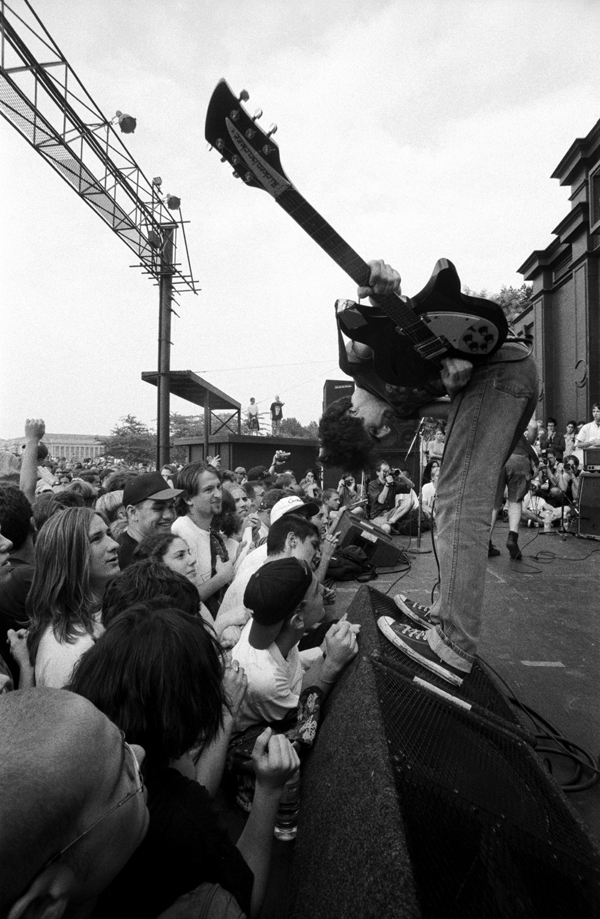 It's embarrassing to see aging rockstars prancing with all the libidinous abandon of teenagers - not the least because of how their jowls flap now that the elasticity has been sapped from their skin. There's something inappropriate in seeing arthritic ex-junkies singing songs like "(I Can't Get No) Satisfaction" and "The Kids Are Alright" when they should be at home watching The McLaughlin Group or Question Time, waiting for their next pension check and wondering why their kids haven't called in so long.
It's embarrassing to see aging rockstars prancing with all the libidinous abandon of teenagers - not the least because of how their jowls flap now that the elasticity has been sapped from their skin. There's something inappropriate in seeing arthritic ex-junkies singing songs like "(I Can't Get No) Satisfaction" and "The Kids Are Alright" when they should be at home watching The McLaughlin Group or Question Time, waiting for their next pension check and wondering why their kids haven't called in so long.But as quickly as everyone groans at cankering Paul McCartney and the withered Bob Dylan, they not only tolerate but encourage the retrospective victory laps being run by "alternative"-era rock icons. No one was convinced that it was necessary, let alone cool, for the Eagles and Fleetwood Mac to reunite in the mid-'90s, but Generation-X and its successors have yet to show a shred of their characteristic disillusioned nonchalance towards the Pixies, Blur, Dinosaur Jr, Faith No More, the Jesus Lizard, the Jesus and Mary Chain, My Bloody Valentine, Sleep... uh, Polvo...
There are almost more '90s bands these days than there where in the '90s.
 This gush of resurrection isn't as welcome with Mark "K-Punk" Fisher, who in the latest issue of Loops attempts to answer the question of why bands don't break up any more. It's a timely query, given that the Pavement reunion has nailed shut the coffin of baby-boomer cultural hegemony. The '90s are haunting the '10s, as they were haunted by the '70s, because - especially in the nanosecond hypecycle of the information age - it takes too much damned effort to remain au courant. No longer endowed with the impetuous energy & autonomy of twentysomethings, Generation-X have more pressing errands than surfing music blogs or attending Todd P shows and are probably content to dust off their 15-year-old Sub Pop & Matador records when they want to tickle their cochlea.
This gush of resurrection isn't as welcome with Mark "K-Punk" Fisher, who in the latest issue of Loops attempts to answer the question of why bands don't break up any more. It's a timely query, given that the Pavement reunion has nailed shut the coffin of baby-boomer cultural hegemony. The '90s are haunting the '10s, as they were haunted by the '70s, because - especially in the nanosecond hypecycle of the information age - it takes too much damned effort to remain au courant. No longer endowed with the impetuous energy & autonomy of twentysomethings, Generation-X have more pressing errands than surfing music blogs or attending Todd P shows and are probably content to dust off their 15-year-old Sub Pop & Matador records when they want to tickle their cochlea.The second issue is the internet itself: a whole generation has by now grown up without the memory of mail-order or the Dewey Decimal System, with the wealth of all history a mere Google search away. "In the age of Web 2.0," writes Fisher, "nothing goes away, everything comes back – if not in the flesh, then as a YouTube clip." How could this produce anything but an infinite feedback loop? It's an odd nostalgic simulacrum - memory not necessarily anchored in experience - but it's a kind of nostalgia nonetheless.
This makes it easy to see why a band that broke up a decade ago would want to reform: in addition to their old fans, there's a whole new generation keen to see what they missed the first time around. Who'd prefer to watch grainy bootleg videos of My Bloody Valentine when you could see them in the flesh?
The other, more cynical answer is that contemporary music is such shit, bereft of imagination or vitality, that the shoes of the last batch of bands have yet to be filled. If the scariest & most dynamic experience to be had in the contemporary hardcore scene is Daughters covering the Jesus Lizard, then please, cut to the chase and get David Yow himself back onstage.
 Fisher seems to reserve special disdain for the acts who, like the Stones and The Who, did not fade away: The Fall, Nick Cave, Sonic Youth, etc. As cynical and sticky-fingered as reunion tours can be, there aren't many people who'd opt not to pay off their mortgage playing in a rock band instead of punching the clock down at patent office or call center. This is easier to understand than the musicians who, through good fortune and/or force of will, never quit the stage. Carl made a similar complaint about "career artists" a while back, but that sounded more like a case of sour grapes than anything. For Mark Fisher, the persistence of formerly "underground" acts is a betrayal of their original raison d'être: "wasn't this everything that post punk's scorched-earth modernism disdained?"
Fisher seems to reserve special disdain for the acts who, like the Stones and The Who, did not fade away: The Fall, Nick Cave, Sonic Youth, etc. As cynical and sticky-fingered as reunion tours can be, there aren't many people who'd opt not to pay off their mortgage playing in a rock band instead of punching the clock down at patent office or call center. This is easier to understand than the musicians who, through good fortune and/or force of will, never quit the stage. Carl made a similar complaint about "career artists" a while back, but that sounded more like a case of sour grapes than anything. For Mark Fisher, the persistence of formerly "underground" acts is a betrayal of their original raison d'être: "wasn't this everything that post punk's scorched-earth modernism disdained?"Of course, if he more closely examined the acts he accuses of perfidy, he'd find no inconsistency. For example, The Fall's mayor domo, Mark E. Smith, has often been compared (by Fisher himself, too) to a factory foreman, a wizened prole whose devotion is solely to his work. Nevermind that it's silly to chastise a band, whose first single included the tune "Repetition", for their dogged persistence; Smith's no-nonsense work ethic and incessant (if inconsistent) productivity are directly at odds with rock's no-future hedonism and its planned-obsolescence capitalist ethos. Also, as the developed world has de-industrialised into an anaesthetised service-oriented pleasuredome, much of society's ills stem from the fact that we don't make anything any more. Amidst regurgitative mash-ups and laptop-toting "performers", a guitar act that pays the rent through gigging, instead of media saturation, is as much an anachronism as steel mills and and mines. This actually casts The Fall further from mainstream society than the band was at its inception in the late '70s.
Sonic Youth, meanwhile, are victims of their own success. It's not that the band ever disavowed itself of the revolutionary intent of the No Wave scene (though I imagine Fisher would be rather disappointed to know that most of its participants went on to join more historically reverent & formalist units like the Lounge Lizards). By the time SY's most startling innovations were behind them and they signed with a major label, the band wasn't selling out to the mainstream: they were the mainstream, godfathers to the entirety of '90s "alternative" culture. Their appearances on MTV and atop festival playbills weren't the product of some crafty publicist, but again of an intransigent work ethic and the crafting of an aural aesthetic that captured the popular imagination.
The problem, then, is not of revolutionary intent or lack thereof, but of what if the revolution succeeds? As pure as it may be then to wipe one's hands, declare the job done, and ride off into the sunset, this leaves the freshly razed ground at the mercy of tyrants & thugs - be it Stalin or the Universal Music Group. Not to forfeit what was fought for requires the victors to become stewards of the movement - in artistic terms, curators. Though this role is frequently disdained for plasticising new forms and jealously protecting legacies, good curators use their seniority to support & shepherd younger artists flush with potential. Even if popular taste swings away, a safe haven for bold thinkers & iconoclasts will have been carved out, with nothing ceded for the sake of fame or money.
 Ultimately, Mark Fisher's article is itself rooted in the kind of memorial arrogance typical of someone past the peak of their cultural relevance. "Modern culture is stagnant & redundant" is in no way different from "shit was better back in the day" - the same, tired moan of countless curmudgeons who can't be bothered to explore the very culture they're criticizing. As I've said before, "all music nods to its antecedents; torches are passed, picked up, or rekindled." It's also reactionary & provincial to protect music from an audience that isn't exclusively "our people." Music, like the word, is a virus, and is impossible to quarantine. What is important is that the underground-mainstream conversation remain one-sided. Steve Albini recently said that
Ultimately, Mark Fisher's article is itself rooted in the kind of memorial arrogance typical of someone past the peak of their cultural relevance. "Modern culture is stagnant & redundant" is in no way different from "shit was better back in the day" - the same, tired moan of countless curmudgeons who can't be bothered to explore the very culture they're criticizing. As I've said before, "all music nods to its antecedents; torches are passed, picked up, or rekindled." It's also reactionary & provincial to protect music from an audience that isn't exclusively "our people." Music, like the word, is a virus, and is impossible to quarantine. What is important is that the underground-mainstream conversation remain one-sided. Steve Albini recently said thatthe more comfortable that outsiders get saying and doing stupid shit, the more the ironic distance narrows. And the ironic distance eventually narrows to a point of nothing. Then you have this sort of ascendancy where something from the underground, by ironically adopting the mannerisms of the mainstream, becomes the mainstream.This, I suspect, is what actually troubles Fisher: the blurring of counterculture and mainstream until the distinction is functionally meaningless. This, however, is not the same as underground artists gaining acceptance from the bourgeois & corporate classes. Musicians shouldn't be punished de facto for their success; if anything, their accidental intrusions into the mainstream should be welcomed as fissures opening to possibility, giving sight to the culturally blind.
It's unreasonable to force artists into retirement simply because their lingering presence is an unpleasant reminder of how old we ourselves are. Nick Cave, Tom Waits, The Fall, and Sonic Youth are all releasing records of far greater audacity than anything Lou Reed, Bowie, or the Stones were releasing at the same age. Had those performers vanished into some subterranean cranny long ago, it would only allow us to feel smug in our apathy towards contemporary culture because dude, shit was real back in our day. Any embarrassment felt towards the senior class of modern musicians is simply that these geezers, these ancients still rock harder & weirder than the juveniles - so what the fuck is wrong with these kids, man? Nevermind the pentagenarians, tell Passion Pit and These New Puritans to step their game up.
And even if, even if, even if the Bad Seeds, The Fall, and Sonic Youth aren't quite as spry as they once were, that's not cause enough to demand they cease practicing their craft. After all, I don't see Mark Fisher shutting down his blog even though his writing's been getting worse over the last couple of years.

















